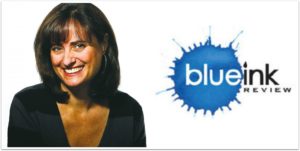With more than 450,000 self-published titles released each year, getting readers to buy your book is no easy task.
But one thing is important above all else: book reviews.
In an age in which consumers choose everything from vacation resorts to televisions to movies by reading reviews, book reviews vouch for your title. They say it’s worth a reader’s time and attention.
That’s where BlueInk Review comes in. We are a fee-based service that provides a book reviews for self-published titles exclusively, using professional, unbiased critics.
My partner and I founded BlueInk Review seven years ago. I had recently lost my job as the longtime book editor at the Rocky Mountain News, when the paper closed in 2009. My partner, Patricia Moosbrugger, had been a literary agent who represented bestselling authors such as Louise Penny and Kate Furnivall.
Both of us saw self-publishing as a bold and growing world, with one problem: how to sort the wheat from the chaff? I was well familiar with the question, as in my book editor job, self-publishers would often call and ask how they could get their book reviewed. My answer, like nearly all my colleagues across the country, was: “Sorry, we don’t review self-published books.” There were simply too many—and too many of marginal quality—to sort through with a limited budget.
With fee-based reviews, that equation has changed. Any author has the same chance at a landing a professional review as those traditionally published.
At BlueInk, we carefully match books with the appropriate professional reviewer. These are people who have largely written for major publications such as the New York Times, and Washington Post or hold senior-level editorial positions at major publishing houses such as Random House and HarperCollins.
They understand the requirements of the genre they are reviewing and are well-read in that field. Most importantly, they are skilled at analyzing what works in a book and what doesn’t (this isn’t nearly as easy as it sounds). And they have the writing talent to clearly articulate all of this in print.
In short, they are not your neighbor or relative who loves books; he or she needs much more than a pile of books by the nightstand to qualify as a credible book reviewer.
The right reviewer is absolutely critical to producing a review that is fair to both authors and readers. If you assign a thriller to someone who prefers literary fiction, that reviewer is likely to react the same way that someone who hates vegetables will upon seeing a plate of peas: They will have a distaste for the book before they even open it.
Our Steps
To help with this tricky match-making process, we ask reviewers to fill out a questionnaire detailing the types of books they enjoy reading. We ask them to go well beyond noting “fiction,” for example, and to let us know if they prefer thrillers, romance, historical fiction, science fiction and so on. When it comes to nonfiction, we ask them if they lean toward history, biography, memoir, self-help, spirituality and other sub-categories.
We also ask reviewers to list their favorite authors. This gives us further clues as to the type of reading they like (someone who loves Jonathan Franzen, for instance, probably isn’t going to be the best pick for a Stephen King-style novel).
Finally, we ask reviewers to tell us what books they “absolutely hate reading.” This way, we will never send them something akin to asking a meat lover to dive into a plate of peas.
Once the review is complete, authors receive a PDF of their review. If they don’t like what the reviewer has to say, they are free to “opt out” of having the review published. If they go forward, we post the review on our website, send it to many other venues, and consider it for publication in our monthly newsletter read by librarians, agents and editors and our column in Booklist magazine, which reaches 65,000 librarians.
We can’t emphasize enough how meaningful it is to have a professional review rather than crowdsourced reviews. Unlike the latter, professional reviews are taken seriously by librarians and booksellers, who rely on credible reviews to make their book-buying decisions. Members of the media look at reviews quoted on press releases to determine if the book is worth coverage. And when readers pick up a book, they look at the back cover to see what professionals (rather than your friend John or cousin Mary) say.
In short, professional book reviews are invaluable to help selling your book.
As Judith Briles noted upon our launch: “Do book reviews count? In a word: yes!”
 Patti Thorn is co-founder of BlueInk Review, which offers serious, unbiased reviews of self-published books. BlueInk reviews are penned by writers drawn from major mainstream publications, such as The New York Times and Washington Post, and editors of respected traditional publishing houses. Select reviews appear in Booklist magazine, a highly respected review publication that reaches 60,000 librarians.
Patti Thorn is co-founder of BlueInk Review, which offers serious, unbiased reviews of self-published books. BlueInk reviews are penned by writers drawn from major mainstream publications, such as The New York Times and Washington Post, and editors of respected traditional publishing houses. Select reviews appear in Booklist magazine, a highly respected review publication that reaches 60,000 librarians.
If you are interested in receiving our blogs with tips on writing and book marketing, please sign up for our mailing list.

